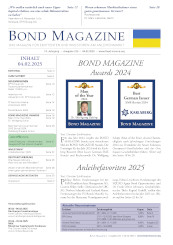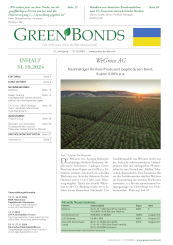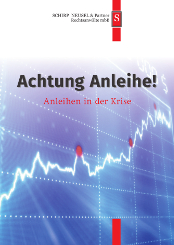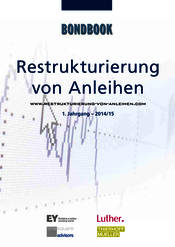4finance S.A. plans to extend the maturity of its 11.25% EUR bond 2016/21 by nine months, so that the new maturity would be in February 2022. The EUR bonds keep the earliest maturity that 4finance has. The extension is necessary because the high yield bond markets are essentially closed as a result of Covid-19. If the amendment is successfully completed, 4finance pays an amendment fee of 25 bps to all bondholders and an additional participation fee of 50 bps for those bondholders who participate in the vote, as CFO Paul Goldfinch explains in an interview with BOND MAGAZINE. Bondholders who have additional questions can contact the company or the financial advisor Aalto Capital in Munich.
BOND MAGAZINE: You would like to extend the maturity of your 11.25% EUR bond 2016/21 (ISIN XS1417876163). What exactly are you planning?
Goldfinch: We are planning to extend the maturity of the EUR bonds by nine months, so the new maturity would be in February 2022. So it’s a relatively short extension, and still keeps the EUR bonds as the earliest maturity we have. No other changes would be made to the terms and conditions. Investors can view all the formal documentation for this on our website at: https://www.4finance.com/investors-and-media/bonds/
BOND MAGAZINE: Why is it necessary to extend the maturity of the bond?
Goldfinch: Originally we had planned to do a normal refinancing of the EUR bonds with a new bond issue. We had already mandated investment banks for this in February and had done a lot of preparation work. However, we have all seen the impact of Covid-19 in our lives in recent months and also on the financial markets. It has meant that the high yield bond markets have been essentially closed for companies like ours. As we discussed in our Q1 results call one month ago, whilst feel we have adapted quite well to the situation, and our online business has largely ‘stayed open’ during this period, there will naturally be an impact on our financial results, particularly over the next couple of quarters.
So, whilst bond markets may recover after the summer, and allow us to do a refinancing already in autumn 2020, we do not feel it is prudent to rely on that. Instead, the proposed extension to the bond maturity will give us more time through 2021 to conduct a refinancing. It also allows management to concentrate on continuing the good operational progress we have been making as we navigate through, and beyond, this difficult period. In our investor consultations so far, we believe that bondholders understand this rationale and will be supportive of the proposal. Standard and Poor’s, one of our rating agencies, also published a report earlier in June indicating they would likely consider this offer as “proactive treasury management”.
BOND MAGAZINE: The EUR bonds mature by May 2021, and your 10.75% USD bond 2017/22 (ISIN XS1597294781), which has a significantly higher volume, will mature in May 2022. What are you planning for the USD bond?
Goldfinch: It’s a good question, and one that we have discussed with many investors. When we think about refinancing, we have to think about both our EUR and USD bonds. This would be the case even if we didn’t extend the EUR bond maturity. So, our task is to properly refinance both bonds, and to establish a new medium to long-term capital structure and maturity profile.
The first part of this is to reduce the overall amount of debt that we have outstanding. In recent years our online business has become a bit smaller in scale. We believe it is more ‘sustainable’, as many more markets are operating within a fully regulated framework these days. But it is somewhat smaller, and so it doesn’t need as much debt funding. That’s why we have been using our excess cash to buy back bonds in recent years, and continued to do this in March and April. So the USD bond that was initially 325 million USD now only has 237 million USD net outstanding. Already this makes it an easier amount to refinance. We retain the flexibility to make further buybacks in coming quarters. And once we establish regular sales of our near-prime loans to our bank, TBI Bank, this will also significantly help with cash levels.
Then if you look at our history in the bond markets over the last 6+ years, we have established a good track record of issuing bonds in many different markets (some more targeted at large institutional asset managers, some more at smaller institutions or high net worth individuals) and currencies (EUR, SEK, USD). So, as an established and transparent issuer with strong market positions and good advisers, we are confident in our ability to conduct proper refinancing in time for the new maturities. Exactly when, and in what format, of course will depend on how market conditions develop in coming quarters.
BOND MAGAZINE: You have bought back both bonds in the past few months. What is the volume of bonds currently outstanding?
Goldfinch: As of 26 June, the nominal value of bonds outstanding and not owned by the Group is EUR 146 million Euros for the EUR bonds and 237 million USD for the USD bonds.
BOND MAGAZINE: The EUR bond was issued in accordance to German law (German Schuldverschreibungsgesetz –SchVG). New York law applies to the USD bond, right?
Goldfinch: Yes that’s correct. Under the EUR bond terms & conditions and German law, the extension to the maturity requires a 75% majority of those voting, with a 50% quorum for the first vote (then 25% for second vote). For the USD bond, New York law applies, and under the terms & conditions for the USD bond, a maturity extension would require a 90% vote of all bondholders, i.e. something that is not typically achievable in practice.
BOND MAGAZINE: How does the bond extension work according to the SchVG?
Goldfinch: The procedure for the voting process and the amendment is very strictly regulated by the bond terms & conditions and the SchVG. We have chosen a ‘Vote without Meeting’ to be most practical for bondholders to participate. I won’t try and cover all the details here, but the timing is roughly a two-week notice period, followed by a three-day voting period.
We have published the formal Invitation to Vote and all other supporting documents and forms on our website. Investors can vote using those forms, or via their custodians through the clearing systems. We would encourage all of our EUR bondholders to participate, and to get in touch with us, or with our advisers Aalto Capital in Munich, if they have any questions.
BOND MAGAZINE: What will you offer bondholders for the possible extension of the term?
Goldfinch: If the amendment is successfully completed, we are offering an amendment fee of 25 bps to all bondholders and an additional participation fee of 50 bps for those bondholders who participate in the vote. In addition, we will also add our operating entity in the Czech Republic to the list of guarantors of the bonds. And of course, investors will also be able to enjoy the healthy coupon of 11.25% that we pay on these bonds for a further nine-month period!
BOND MAGAZINE: What is your current cash position?
Goldfinch: In our Q1 results we indicated that online cash levels at the end of May were around 90 million Euros. The figure is still around the same level (as of late June).
BOND MAGAZINE: How is the business developing in your key markets?
Goldfinch: We described in our Q1 results how business was developing in our key markets, with online loan issuance levels much reduced in April, but starting to increase in May. The main update since then is that we are issuing more loans in Spain this month, so online loan issuance overall in June is already ahead of May, with a few days still to go.
BOND MAGAZINE: How has asset quality developed during the Covid-19 time?
Goldfinch: The ultimate impact of Covid-19 on asset quality will take some time – a few quarters really – to become clear. And if unemployment levels do rise, then this will likely have an impact on our asset quality. However, the actual data that we are seeing so far since March has been relatively good. Our online loan repayment dynamics already recovered to normal levels in May, and are slightly better in June. This is partly because we have tightened our lending criteria, which reduces issuance volumes, but should result in better credit quality.
We have been proactive in supporting our customers who experience difficulties due to the current situation with measures including discounted or free payment deferrals. These have been subsequently reinforced by similar regulatory measures in many markets, but the overall levels of take-up for these remains quite low, with requests concentrated in the TBI Bank portfolios (mainly business banking) and in the Czech Republic, where they are automatically available on request.
In many of our markets, governments have also introduced additional state ‘safety nets’, similar to the German Kurzarbeit scheme, that have helped to support people particularly affected by Covid-19, particularly in our typical median to lower income customer segments.
BOND MAGAZINE: Regulation of non-bank lending is increasing in many countries. What is the current development?
Goldfinch: As I mentioned, this has been a trend in recent years, and many of our markets now have established regulatory frameworks for non-bank lending. As a responsible lender, we welcome balanced regulation. It sets out a clear basis for firms like ours to operate, making it more sustainable, and gives customers a regulated option. We have seen a couple of markets, like Poland and Finland, introduce temporary reductions to their caps on consumer lending charges. In Poland, we are a market leader and have already adapted our products. In Finland, a small market for us, by halving the rate cap from 20% a year to 10% a year it makes it hard for us to be viable there. Separately to Covid-19 impacts, we are also excited about the launch our new products in Denmark in July when the new regulatory framework, which has been in process for some time, comes into force.
BOND MAGAZINE: Please explain your funding strategy near- and mid-term!
Goldfinch: I think I have largely covered this in the discussion on refinancing. But from an overall perspective we want to diversify our sources of funds, and lower our cost of funds. The lower funding cost is particularly important for our growing near-prime loan portfolios, which have a higher credit quality but lower yield than our traditional online loans. The main things we are focused on are optimizing the use of TBI Bank for funding, including the initiatives to sell near-prime loans to the bank, and then – once the bond amendment process is completed – the successful refinancing of our bonds.
BOND MAGAZINE: What outlook can you give?
Goldfinch: We are limited in what we can say about outlook, and in the current circumstances it’s particularly hard to forecast the future. But I can reiterate that navigating the next few months will continue to be challenging, but as a management team and board we are confident the business is well positioned to weather the storm and that we have the experience and operational capability to do this. And we are actively planning now, so we can build on our industry leading market positions in the future.
The interview was conducted by Christian Schiffmacher, https://www.fixed-income.org/
Photo: Christian Schiffmacher (left) in conversation with Paul Goldfinch (right)














